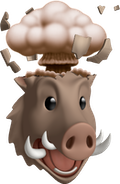The Jurchen Jin dynasty (meaning “Golden”) ruled parts of China, Mongolia, and northern Korea from 1115 to 1234 CE. The Jurchen originated from Manchuria, but in conquering the neighbouring Liao empire of the Khitan and parts of Song China, they came to rule the Great Plain of Asia from 1127 CE until their fall at the hands of the Mongols. It is not to be confused with the Chinese Jin dynasty which ruled China from 266 to 316 CE.
Origins & Prosperity
The Jurchen were a subject tribespeople in the north-eastern part of China with the most important clan being the Wanyan. The Jurchen were descendants of both the nomadic Tungus Malgal peoples and the remnants of the defunct Balhae (Parhae) kingdom of Manchuria and northern Korea. They spoke the Tungusic language. Living in small walled towns and villages around the Liao and Sungari rivers, they were hunters and farmers. Those groups near the neighbouring state of China adopted more sophisticated technologies and cultural practices while in more central and northern areas the Jurchen remained closer to their traditional roots. Expert at animal husbandry, the Jurchen specialised in horse breeding, which became a significant source of wealth. By the mid-11th century CE, they exported some 10,000 horses to the Khitan Liao state each year.
The Jurchen were not entirely free, though, and had to pay an irksome annual tribute to their more powerful western neighbours, the Liao state, which usually took the form of furs, falcons, and pearls during the 11th century CE.
Conquest of the Khitan
In the early 12th century CE the Jurchen began to challenge the regional dominance of the Liao empire and the kingdom of Goryeo (Koryo) in Korea. The whole precarious balance of treaties and tributes in East Asia was about to collapse. An 1103 CE revolt eventually led to a war with Goryeo, when the Jurchen were led by the Wanyan leader Yingge. Winning round one, the Jurchen then had to face a fightback. In 1107 CE the Koreans sent a specialised army (pyolmuban) of cavalry and infantry led by the general Yun Kwan for the purpose of ridding themselves of this foreign nuisance. Initial victories and the establishment of fortifications by Goryeo did not prevent a resounding defeat in 1109 CE. The horsemanship, archery skills, and great mobility of the Jurchen army proved far superior and an ominous warning of what steppe cavalry might achieve in the region in the coming centuries.
The Jurchen were thus able to form their own state, the Jin, with Wanyan Aguda, their ruler, even declaring himself an emperor in 1115 CE. The Song dynasty of China (960-1279 CE) took advantage of the Jin territorial ambitions, and the two states joined forces to defeat the Liao state, who had since then dominated the region of northern China and Mongolia. Aguda, now calling himself Emperor Taizu, attacked Jehol (Rehe), the Liao supreme capital, in 1120-21 CE, and the Liao dynasty, weakened already by an internal schism between the sinicized elite and more traditional clans, finally collapsed four years later.
Invasion of Song China
Aguda was succeeded by Emperor Taizong in 1123 CE, and almost immediately he set about expanding his empire. In 1125 CE, realising their former ally the Song were militarily weak, the Jin attacked parts of northern China over the coming year. Even the great general Tong Guan (1054-1126 CE) could not stop the invasion which saw the capital Kaifeng besieged. The emperor Huizong (r. 1100-1126 CE) was captured along with thousands of others, and the Jin acquired a huge swathe of territory down to the Yangtze River. The Song were compelled to pay the Jurchen a massive ransom to avoid any more loss of life. The defeat necessitated the Song court relocate to the Yangtze Valley, and they eventually established a new capital in 1138 CE at Hangzhou (aka Linan) in Zhejiang province. This was the beginning of the Southern Song dynasty. Relations between the Jin dynasty and Song China thereafter remained mostly friendly, with a formal peace treaty signed between the two states in 1142 CE. The weakened Song, once again happy to pay off a dangerous neighbour in tribute rather than engage in more costly wars, sent the Jin silk and silver in huge quantities.
Government
The Jin capital was at Shangjing (modern Harbin), but in 1153 CE it was moved to Yanjing (modern Beijing) following the takeover of the Liao territory. As with many states which bordered with China, the Jin adopted many Chinese political and cultural practices. China was always seen as the great civilised state in East Asia, and its methods of administration and bureaucracy were effective enough to be copied by newer states like the Jin. The Jurchen also adopted writing characters similar to those in Chinese, although the Jurchen language itself is yet to be deciphered. Some things it did not copy though, and one was the Confucian reverence for officialdom. Jin rulers were not averse to publicly flogging corrupt or inept senior officials, a treatment unheard of in Chinese government.
Collapse
The nomadic Mongol tribes had been assembled under the leadership of Genghis Khan (r. 1206-1227 CE), and they repeatedly attacked and plundered the Xia and Jin states in the first three decades of the 13th century CE. Attacks came in 1205 and 1209 CE, and then, in 1211 CE the Mongols stepped up their invasion and entered Jin territory with two armies of 50,000 men each. The Jurchen were able to field 300,000 infantry and 150,000 cavalry but the Mongol tactics proved that numbers were not everything. Genghis Kahn would savagely sack a city and then retreat so that the Jin could retake it but then had to deal with the chaos. The tactic was even repeated several times on the same city. One Jin official, Yuan Haowen (1190-1257 CE) wrote the following poem to describe the devastation of the Mongol invasion:
White bones scattered
like tangled hemp,
how soon before mulberry and catalpa
turn to dragon-sands?
I only know north of the river
there is no life:
crumbled houses, scattered chimney smoke
from a few homes.
(in Ebrey, 237)
The Jin were not helped by their own internal problems either. Besides chronic corruption emptying the state coffers and the odd natural disaster in the form of floods, in 1213 CE the emperor, Feidi, was assassinated by a Jin general whose own candidate was himself assassinated only two months afterwards. The Jin rulers were compelled to retreat south and pay tribute to the Great Khan, although they were probably glad to, faced with the stark alternative. It was a respite but worse was to come as the Mongols reattacked in 1215 CE. The Jin state, now nothing more than a province, finally came to an end when it could not withstand another invasion, this time sent by Ogedei Khan, in 1234 CE. It was not an end to the tribe, though, and the nomadic Jurchen continued to raid northern Korea in the 14th and 15th centuries CE. Then, known in this period as the Manchurians, they conquered the peninsula completely in 1636 CE.
From worldhistory.org
- 🐻Link to all Hexbear comms https://hexbear.net/post/1403966
- 📀 Come listen to music and Watch movies with your fellow Hexbears nerd, in Cy.tube](https://live.hexbear.net/c/movies
- 🔥 Read and talk about a current topics in the News Megathread https://hexbear.net/post/5882504
- ⚔ Come talk in the New Weekly PoC thread https://hexbear.net/post/5894084
- 🏳️⚧️ Talk with fellow Trans comrades in the New Weekly Trans thread https://hexbear.net/post/5881812
- 👊 New Weekly Improvement thread https://hexbear.net/post/5878078
- 🧡 Disabled comm megathread https://hexbear.net/post/5819594
- ☕ Parenting Chat https://hexbear.net/post/5882839
- 🐉 Anime & Manga discussion thread https://hexbear.net/post/5765324
reminders:
- 💚 You nerds can join specific comms to see posts about all sorts of topics
- 💙 Hexbear’s algorithm prioritizes comments over upbears
- 💜 Sorting by new you nerd
- 🐶 Join the unofficial Hexbear-adjacent Mastodon instance toots.matapacos.dog
Links To Resources (Aid and Theory):
Aid:
Theory:
Yves vegan trash meats has fallen…they had the best nuggies, tofu dogs and fake deli meats for sammiches around for an okay price. Making fajitas with their cut up nugs had been a staple of being sick of cooking for a living post work food for me. Don’t make everything effort food or expensive as hell dammit.
Tankietube is down :[
it is august 27 and stalin saved the world from fascism
Can’t wait to get my first paycheck from my new job so I can finally feel something

One of my hexbear friends is coming over to visit and I’m SO excited! This is easily the highlight of my year, nothing else could make me this happy
Roman Anthony
Holy fuckin shet I have been cleaning my huge vinyl blinds for like 6 hours my knees hurt

 ⬅️ me finding out that epubs are just zip files with html inside
⬅️ me finding out that epubs are just zip files with html insideThis was a pretty good megathread, right? But did u see the gorilla?
came up with a bit idea of a game where the rules are random and constantly changing and the real game is to figure out the rules then I realized that’s life under capitalism

Vampires sleep a lonnnnggg time if you think about it. Their entire day is gone
Another apartheid state that Israel helped out

i talked a bunch of shit at work and now i’m in an informal hot sauce competition where the only prize is going “lol i made a better sauce” and all the most interesting recipes i see are fermented and I’m not allowed to ferment stuff

Talking about mixing chocolate and garlic made me think “i bet a chocolate hot sauce would be weird” and i found this recipe WARNING TIKTOK LINK but ugh it’s fermented
Should i just do all that without the fermentation process
At the risk of showing my ignorance, but in the interest of not wanting to be ignorant anymore, what does the acronym EMPOC mean? Search engines keep insisting on giving me definitions of a medical/fitness term called EPOC.










